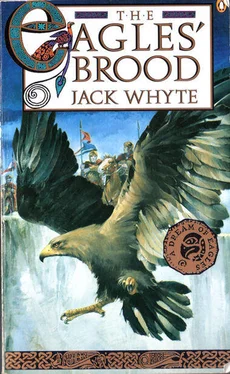I rose slowly from my seat and crossed to the table where the statue stood and, reaching out my hand, I traced my fingertips across her cold surface, seeing in my mind other phrases that spoke of "generous curves" and "ample" breasts and buttocks. I thought of Occa and her large breasts, belly and buttocks. They were ample. But the word did not apply, as I understood it, to the Lady's shape.
I heard a movement behind me and turned to see Uncle Varrus staring at me, an odd expression on his face that made me afraid again.
"Uncle?"
He ignored me, turning slowly to walk from the room, and as he did so, I saw a streak of wetness on his cheek. The sight shocked me and I stood there gaping as I watched him walk away. I knew something bad had happened, and as soon as he had gone I went running myself to find out what was wrong. I met Uther in one of the corridors, running to find me and tell me the news. Equus, my uncle's closest friend, had been found dead in the forge. He had been working alone, it seemed, when he died, and had fallen at his anvil. By the time they found him, the blade he had been working on was cold, but it had burned through his thighs to the bone before it cooled.
Uther turned and ran towards the stables as soon as he had blurted out his news, assuming that I would be at his heels, as keen as he to see whatever was to be seen, but I made no move to follow him. His excited words had immediately plunged me into a state of complete terror and overwhelming nausea, and I sank to the floor to huddle with my knees gripped tightly between my arms and the cold sweat of sickening fear fouling my hot skin.
I had dreamed Equus's death two nights before, but his agony had been mine! My mind quaked with horror as I remembered, in awful detail, the excruciating pain that had consumed me and brought me screaming to wakefulness in the darkness of my room. A glowing, white-hot band of pain had fallen across my legs, searing my thighs and groin, and I had seen the smoke belching from the awful wound it caused and smelled the charring stench of my own cooking flesh.
I had long been plagued by such dreams. Indeed, I could not remember a time when I had not been disturbed by the formless memory of some nocturnal terror. They did not come often, but when they did, I awoke in horror, sickened to the point of vomiting and drenched with the sweat of abject fear. I seldom remembered any details, but invariably I suffered for hours afterward, wracked with chills and cramps and painful nausea. And always, it seemed, formless as the dreams had been, they returned in splintered fragments to haunt me during my waking hours, unexpectedly recalled by some detail or incident that seemed to waken echoes in my soul and frightened me unreasonably.
Now it had happened again, but this time I could not deny the reality. Equus, the gentle, friendly giant, lifelong companion of Uncle Varrus, had died in just the manner I had dreamed! A series of images of Equus flashed through my mind, all of them portraying him as I had always known him, working alone with his beloved iron amid the smoke- hazed half-light of his smithy. Sparks showered upward from his hammer as he lovingly crafted the furnace-heated metal of sword and spearhead and ploughshare, and suddenly I saw him fall, dropping his pincers and their glowing contents, and again I felt the pain and smelled the stink of burning.
I do not know how long I crouched there in terrified solitude, but I arose at length and went out into the bright afternoon. No one sought to stop me, and I ran for miles, vainly trying to escape the terror I bore inside me. When I stopped at last, I sat beneath a tree and wept, shuddering with formless guilt, until the trembling in my limbs died down. And for a while I slept.
On my return to Camulod, however, I told no one what I thought, or what I felt, or what I had dreamed. People would have thought me mad. At times—on those few occasions when I could overcome my inner fears enough to think about my terrors for a brief spell—I, too, feared I might be mad. And so I made myself forget the entire incident. Only once more, when Uncle Varrus mentioned that Equus could have felt no pain, since his apoplexy would have rendered him unconscious, did I feel guilt and fear.
That episode marked the beginning of a tragic time in our household. The Druids say that deaths occur in threes and I must admit now, in my old age, that three has always seemed to me to be a potent number, endowed with mystical proclivities, and never more so than in this strangeness of deaths. Old Bishop Alaric, close and longtime friend of both my grandfather and Uncle Varrus, died in his sleep within three days of Equus and was found at the third hour of the morning. My great-uncle Ullic, Uther's grandfather, also died within the month, his back broken in a fall from a rock. Throughout his life he had often sat on this rock, a boulder on a bare hillside from which he swore he could overlook his entire kingdom. I heard that he had risen to climb down from his seat and simply pitched over backwards as though his heel had caught on. some projection, although none was there.
There was no gaiety in our house that winter and for a long, long time I had no other opportunity to speak to my uncle about the mystery of the statue. It was not until the springtime that I found myself alone with him again, and him in the frame of mind that might at last make allowance for my curiosity. It had been the kind of afternoon I had grown used to in the long winter months. Uncle Varrus had done no writing since the day Equus died, seeming content to sit unmoving by the fire, his eyes far off as though he were living elsewhere. His hair, even his beard, had turned white and he looked very old. I was reading that day, and Uther was about his own affairs, probably in the woods below with some girl. Aunt Luceiia had come into the room and I had half heard her. fussing over my uncle. There had been a mention of "the boy" and then I had been aware of her leaving.
Sometime after that, my uncle spoke. "What are you doing, Caius?"
"Reading, Uncle." This was the first time he had spoken directly to me in months.
"I can see that, boy. What are you reading? That's what I want to know."
"Your books, Uncle. I was reading about your forge in Colchester." With a sinking feeling, I realized he would think immediately of Equus and feared he might withdraw into his thoughts again, but he surprised me.
"And what about it? Why does that interest you?"
"Well, I was reading again about how you found the dagger that your grandfather had made for you."
"Ah! The skystone dagger." He fell silent for a spell, thinking of it, then, just as I was thinking he had forgotten me, he spoke again. "It was beautiful, Caius, the most beautiful thing I had ever seen. Equus had hidden it, along with all the other treasures my grandfather had left for me. Poor Equus! I miss him, Cay. You never saw the dagger, did you?"
"No. You buried it with Grandfather, when I was still a baby."
"Aye, that I did. It seemed fitting."
"Uncle?"
"Aye? What is it?"
"Why did you bury the dagger with Grandfather? It must have been very valuable." I was looking directly at him and was happy to see the fond, real smile that had been absent for so long from that beloved face.
"You think it was wrong of me to bury the thing I had loved most in this world with the man I had loved most?" He paused and considered that for a few moments. "Well, there are probably others who would agree with you." Again he paused. "I wonder if I can explain that to you. The dagger was a dream, Cay. A dream come true for my grandfather and for me. But Caius Britannicus had had a dream that came true, too."
"Camulod," I said.
"Aye, Camulod. His Colony. That dagger of mine, with its mirror-bright blade, seemed to me to embody whatever it was that drove both your grandfather and me to make our dreams real. It was a shining proof that great and wondrous things, things miraculous, can spring from the minds of men. It pointed the way for both of us and led us to satisfaction. So, when he died, it seemed to me fitting that he should take it with him, wherever he might go. I buried it and him together and I have never regretted the impulse." He looked straight at me. "Does that make any sense to you at all?"
Читать дальше









